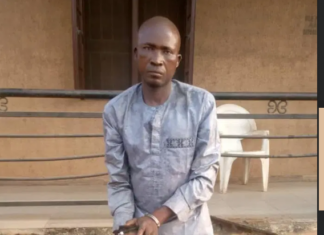By Lechi Eke
1948 Nobel Prize laureate in Literature, Thomas Stearms Eliot, best known as T. S. Eliot, was born in St Louis Missouri to a Boston Brahmin family. He attended Universities of Oxford and Harvard, but failed to take his final oral exams, and so did not pick his PhD. At the age of 25, in 1914, he moved to England, and became friends with Virginia Woolf and husband, Leonard.
Eliot, an American-English poet, playwright, literary critic, and editor, is best known as a leader of the Modernist literary movement in his chosen genre, poetry – his versification is prose-like, typical of literary modernism. His poem, The Waste Land is considered by the cognoscente as the most influential poetic work of the 20th century.
It was published in 1922 with a disjointed 434 lines on 64 pages, and divided into five sections, which are: The Burial of the Dead, A Game of Chess, The Fire Sermon, Death by Water, and What the Thunder Said. Just as the titles suggested, the five sections treated different themes, delving into the Holy Grail, The Bible, tarot cards, eastern religion, etc.
Eliot’s style in The Waste Land which he insisted that the poem’s title is made up of three words is marked by hundreds of allusions and quotations from existing texts, well-known and obscure. The poet took quotations from highbrow texts such as Shakespeare, Ovid, Homer, etc, as well as lowbrow quotes such as, “He do the police in different voices” which was later removed, and a 1912 popular song about Shakespeare.
Notable literary critic, E. M. Forster in his 1936 review didn’t think too highly of the poem. He writes, “There are outworks and blind alleys all over the poem…”
The poet was interested in the Dramatic Monologue, a style you can see in the poem from the excerpt. He jumps from one voice to another, and uses multiple foreign languages: Latin, Greek, Italian, German, French and Sanskrit.
The five sections of the poem are:
- The Burial of the Dead which treated disillusionment and despair.
- In A Game of Chess the poet uses different narrators to narrate different experiences utilizing different descriptive literary sketches.
- In The Fire Sermon, the poet contrasts a philosophical viewpoint using the imagery of death and asceticism with influences of Augustine of Hippo and eastern religion.
- Death by Water is a short lyrical poem of petition.
- What The Thunder Said concludes the quintet with an image of judgement.
Excerpts from the different sections of the poem:
I. The Burial of the Dead
April is the cruellest month, breeding
Lilacs out of the dead land, mixing
Memory and desire, stirring
Dull roots with spring rain.
Winter kept us warm, covering
Earth in forgetful snow, feeding
A little life with dried tubers.
Summer surprised us, coming over the Starnbergersee
With a shower of rain; we stopped in the colonnade,
And went on in sunlight, into the Hofgarten,
And drank coffee, and talked for an hour.
Bin gar kine Russin, stamm’ aus Litauen, echt deutsch.
And when we were children, staying at the archduke’s,
My cousin’s, he took me out on a sled,
And I was frightened. He said, Marie,
Marie, hold on tight. And down we went.
In the mountains, there you feel free.
I read, much of the night, and go south in the winter.
What are the roots that clutch, what branches grow
Out of this stony rubbish? Son of man,
You cannot say, or guess, for you know only
A heap of broken images, where the sun beats,
And the dead tree gives no shelter, the cricket no relief,
And the dry stone no sound of water. Only
There is shadow under this red rock,
(Come in under the shadow of this red rock),
And I will show you something different from either
Your shadow at morning striding behind you
Or your shadow at evening rising to meet you;
I will show you fear in a handful of dust.
II. A Game of Chess
The Chair she sat in, like a burnished throne,
Glowed on the marble, where the glass
Held up by standards wrought with fruited vines
From which a golden Cupidon peeped out
(Another hid his eyes behind his wing)
Doubled the flames of seven branched candelabra
Reflecting light upon the table as
The glitter of her jewels rose to meet it,
From satin cases poured in rich profusion;
In vials of ivory and coloured glass
Unstoppered, lurked her strange synthetic perfumes,
Unguent, powdered, or liquid—troubled, confused
And drowned the sense in odours; stirred by the air
That freshened from the window, these ascended
In fattening the prolonged candle-flames,
Flung their smoke into the laquearia,
Stirring the pattern on the coffered ceiling.
Huge sea-wood-fed with copper
Burned green and orange, framed by the coloured stone,
In which sad light a carvèd dolphin swam.
Above the antique mantel was displayed.
As though a window gave upon the sylvan scene
The change of Philomel, by the barbarous king
So rudely forced; yet there the nightingale
Filled all the desert with inviolable voice
And still she cried, and still the world pursues,
“Jug Jug” to dirty ears.
And other withered stumps of time
Were told upon the walls; staring forms
Leaned out, leaning, hushing the room enclosed.
Footsteps shuffled on the stair.
Under the firelight, under the brush, her hair
Spread out in fiery points
Clawed into words, then would be savagely still.
“My nerves are bad to-night. Yes, bad. Stay with me.
“Speak to me. Why do you never speak. Speak.
“What are you thinking of? What thinking? What?
“I never know what you are thinking. Think.”
I think we are in rats’ alley
Where the dead men lost their bones.
“What is that noise?”
The wind under the door.
“What is that noise now? What is the wind doing?”
Nothing again nothing.
“Do
“You know nothing? Do you see nothing? Do you remember
“Nothing?”
I remember
Those are pearls that were his eyes.
“Are you alive, or not? Is there nothing in your head?”
But
O O O O that Shakespearean Rag —
It’s so elegant
So intelligent
“What shall I do now? What shall I do?”
“I shall rush out as I am, and walk the street
“With my hair down, so. What shall we do to-morrow?
“What shall we ever do?”
The hot water at ten.
And if it rains, a closed car at four.
And we shall play a game of chess,
Pressing lidless eyes and waiting for a knock upon the door.
When Lil’s husband got demobbed, I said—
I didn’t mince my words, I said to her myself,
HURRY UP PLEASE ITS TIME
Now Albert’s coming back, make yourself a bit smart.
He’ll want to know what you done with that money he gave you
To get yourself some teeth. He did, I was there.
You have them all out, Lil, and get a nice set,
He said, I swear, I can’t bear to look at you.
And no more can’t I, I said, and think of poor Albert,
He’s been in the army four years, he wants a good time,
And if you don’t give it him, there’s others will, I said.
Oh is there, she said. Something o’ that, I said.
Then I’ll know who to thank, she said, and give me a straight look.
HURRY UP PLEASE ITS TIME
If you don’t like it you can get on with it, I said,
Others can pick and choose if you can’t.
But if Albert makes off, it won’t be for lack of telling.
You ought to be ashamed, I said, to look so antique.
(And her only thirty-one.)
I can’t help it, she said, pulling a long face,
It’s them pills I took, to bring it off, she said.
(She’s had five already, and nearly died of young George.)
The chemist said it would be alright, but I’ve never been the same.
You are a proper fool, I said.
Well, if Albert won’t leave you alone, there it is, I said,
What you get married for if you don’t want children?
III. The Fire Sermon
The river’s tent is broken: the last fingers of leaf
Clutch and sink into the wet bank. The wind
Crosses the brown land, unheard. The nymphs are departed.
Sweet Thames, run softly, till I end my song.
The river bears no empty bottles, sandwich papers,
Silk handkerchiefs, cardboard boxes, cigarette ends
Or other testimony of summer nights. The nymphs are departed.
And their friends, the loitering heirs of city directors;
Departed, have left no addresses.
By the waters of Leman I sat down and wept. . .
Sweet Thames, run softly till I end my song,
Sweet Thames, run softly, for I speak not loud or long.
But at my back in a cold blast I hear
The rattle of the bones, and chuckle spread from ear to ear.
IV. Death by Water
Phlebas the Phoenician, a fortnight dead,
Forgot the cry of gulls, and the deep sea swell
And the profit and loss.
A current under sea
Picked his bones in whispers. As he rose and fell
He passed the stages of his age and youth
Entering the whirlpool.
Gentile or Jew
O you who turn the wheel and look to windward,
Consider Phlebas, who was once handsome and tall as you.
V. What the Thunder Said
After the torchlight red on sweaty faces
After the frosty silence in the gardens
After the agony in stony places
The shouting and the crying
Prison and palace and reverberation
Of thunder of spring over distant mountains
He who was living is now dead
We who were living are now dying
With a little patience
Here is no water but only rock
Rock and no water and the sandy road
The road winding above among the mountains
Which are mountains of rock without water
If there were water we should stop and drink
Amongst the rock one cannot stop or think
Sweat is dry and feet are in the sand
If there were only water amongst the rock
Dead mountain mouth of carious teeth that cannot spit
Here one can neither stand nor lie nor sit
There is not even silence in the mountains
But dry sterile thunder without rain
There is not even solitude in the mountains
But red sullen faces sneer and snarl
From doors of mudcracked houses
If there were water
And no rock
If there were rock
And also water
And water
A spring
A pool among the rock
If there were the sound of water only
Not the cicada
And dry grass singing
But sound of water over a rock
Where the hermit-thrush sings in the pine trees
Drip drop drip drop drop drop drop
But there is no water













